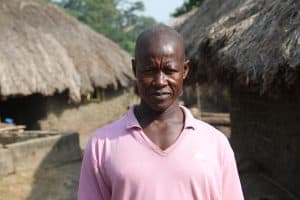The village of Kasema is practically a dictionary definition of “off the grid.” Set in a remote, rural corner of Sierra Leone, miles of dirt roads navigable only by 4X4 or motorbike lie between it and the nearest town. Even then, visitors must cross several streams and pass through tropical forest to reach its population of 450.
That means that most of the time, life floats calmly by for Kasema’s residents, who rely on subsistence agriculture. Beside their traditional adobe and straw houses, iron pots filled with cassava leaf stew bubble away and pigs graze lazily in the sun.
But through the years, informality of land ownership and vagueness over where one plot ends and another begins has led to problems. “I’ve had disputes with other villages before,” says Patrick Ali, a 35-year-old farmer. “When you go out farming, you can step into each other’s land. There aren’t signs telling you where it is.”
At least, there weren’t any signs until recently. But Kasema is part of a policy pilot that could revolutionize land ownership across the west African nation, reducing conflict between neighboring villages and empowering low-income, rural villagers who have long been exploited by wealthy and politically powerful outsiders.

Since 2018, a mapping project led by the government and supported by the UN’s Food and Agriculture Organization and international legal non-profit Namati has been carried out in 24 communities across three regions of Sierra Leone. In each one, the size, boundaries and title of all the land in these villages have been documented. At the same time, committees made up of several locals have been formed to spread the balance of power in the villages, which have traditionally been ruled by a paramount chief.
The pilot is working on the basis of the National Land Policy, a landmark reform passed in 2015 that replaced outdated colonial rules from nearly a century ago. Campaigners believe the policy will help rural communities protect their customary and Indigenous lands — and the natural resources within them — from land grabbers and exploitative foreign investors, as well as preventing local conflicts.
“This is about knowledge of natural resources at the community level,” says Daniel Sesay, senior programs officer for Namati in Sierra Leone. “In the past, villagers could be ignorant about the land that they have and the value of it. That lack of information has historically allowed them to be exploited.”
Troubles over land date back to Sierra Leone’s colonization and the dual land tenure system that emerged. In the wealthier region surrounding the capital Freetown, land ownership is based on freeholds. But in the provinces, land is owned both by families and communally — giving local chiefs significant power to make decisions over the land of their villagers. That has often resulted in the chiefs, who are the custodians of the land, making deals with companies looking to profit from the rich natural resources like gold, diamonds and rubber without the consent of community families.
“In some cases, machines just arrive on their land,” says Sesay. “The families have no idea what’s going on. But the chief might have agreed to allow miners or loggers to do work for payment. The families don’t see the benefits.”
By mapping community land, which is carried out in a participatory manner that involves all stakeholders and forges consensus, and creating local committees, which discuss all major changes to the land and have the ability to introduce bylaws, Sesay says that villagers have greater tenure security and influence over decision making. They are also likely to treat the land more sustainably, given it is in their long-term interests.
According to Namati, the pilot has had significant success. Several age-old land conflicts were resolved during the boundary harmonization and mapping process, and conflicts that had the potential to develop were nipped in the bud. Out of 33 conflicts identified, 29 were successfully resolved and four are awaiting legal cases.
In Kenema district, for example, two neighboring villages had repeated disputes over a stream they shared in common. But following the pilot process, the communities agreed to temporarily suspend fishing while discussions took place, plant trees along the stream to make use of the land and co-manage it in the interest of future generations.
Some villages have also introduced progressive bylaws regarding the use of natural resources, with the democratic committees providing a longer-term, sustainable approach to land. Four communities — Gbangban, Roportor, Njaluahin and Malimp — have introduced bylaws to ban charcoal burning. Others have also either prohibited timber logging or made the community an integral part of the approval process.
The pilots have also shown that clarity of land tenure leads to fairer investment deals.
After mapping and a legal education session by Namati, Ngovokpahun, a village in Kenema district, realized that they were being grossly underpaid by a foreign rubber plantation company. The company was paying the community $2 per acre — $3 per acre under the government’s recommended price. The deal was renegotiated and the price was raised as a consequence.

Another crucial aspect of land reform, according to proponents, is that it is closely tied to advancing equality and protecting women’s rights. Women deliver 60 to 80 percent of agricultural output in Sierra Leone, yet are given the worst access to land.
Land tenure is largely governed by customary law. Most land is managed by male head of households and influential male elders. While discrimination against women is banned under national law, in reality women’s land rights are subordinate and they have limited input in decision-making. When a husband dies, for example, the wife inherits nothing — neither the home they lived in nor the farmland they tilled.
Under the 2015 policy, women must have fair representation on land governance committees. Some communities have also passed bylaws giving women equal opportunity to harvest wild crops and participate in land-related consultations as well as banning domestic abuse. “Better land laws lead to women thriving,” says Sesay.
The success of the policy pilot is being followed by a bill that will bring these changes into law. Having gone through its first reading in Sierra Leone’s parliament, supporters expect the bill to pass this quarter.
However, it has not been all plain sailing. There is political opposition to a provision known as the “justice fund,” which would require companies to pay a fee towards legal services for communities as part of their investment. The proposal for women to make up at least 50 percent of land committees has also been reduced to just 30 percent.
There has also been political resistance to weakening the power of paramount chiefs, some of whom have links to parliament. Those villages involved in the pilot were in part chosen because the chiefs were open to the progressive land reform, but not all will be so willing to give up power. “It’s an enormous challenge ahead,” says Sesay. “But Sierra Leone has a land policy now, and we believe that once communities know their rights and are able to exercise them, change will be made.”
With over 8,000 villages in Sierra Leone, the bill could still transform the lives of millions, according to Hubert Ouedraogo, a land rights expert based in Burkina Faso who last year carried out an assessment of land governance in 13 African countries, including Sierra Leone.

“The huge benefits are peace and productivity,” he says. “You can secure peace because conflicts are deeply rooted in land issues. You can also help people be able to invest in their own land. It’s important that they are secure in their land and not afraid of losing it. Then productivity will increase.”
Sierra Leone’s progress is part of a wider trend across the continent. A decade ago, only four countries had a national land policy; now there are 20. “Sierra Leone is going in the right direction,” says Ouedraogo. “They developed the policy in a very participatory manner, they piloted, and they are doing a land law now.”
But Ouedraogo warns there are obstacles too: as seen in Sierra Leone’s parliament, those benefiting from the status quo will push back hard. Any reform also requires money and support, whether from foreign funding or local political will. Lastly, a powerful communication strategy is needed, so the beneficiaries of the reform are aware and able to actively get behind the effort. “You really need to prepare,” he says.
Back in Kasema, residents say that since the mapping was completed they feel a sense of security over their land. “One of the great benefits is to know the boundaries with my neighbors,” says Patrick Ali, who owns three plots in Kasema. “I have no fear that I will go into their land.”
Ali, whose great grandparents from the Mende tribe lived on the same land, has no plans to sell off his heritage. “Now I know the exact quantity and value of the land I own. If an investor comes, I will not sell the land, but I could lease it. It’s my choice.”



